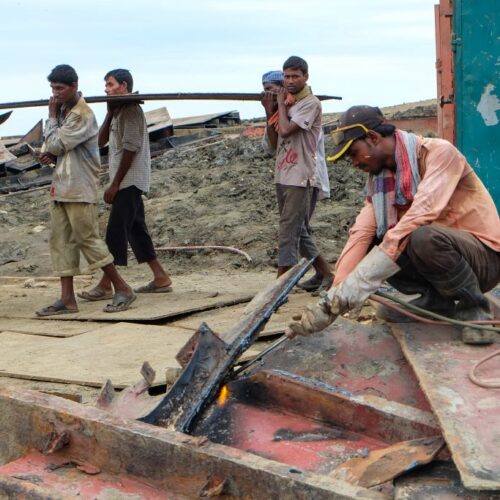Platform News – European Union sets a global standard for sustainable ship recycling: NGOs call on shipping companies to use EU approved yards
Today, the European Commission (EC) publishes technical guidance for ship recycling facilities that want to be approved under the EU Ship Recycling Regulation. The European Union (EU) mirrors with this step the call by environmental and human rights NGOs for a relocation of ship recycling to platforms that can ensure sustainable practices. Facilities that intend to be listed as EU-approved will need to ensure safe working conditions, pollution control including proper downstream waste management and enforcement of international labour rights.

According to the EU, ship recycling is an industrial activity that needs industrial methods, equipment and standards. Workers and the environment anywhere in the world have the same right to protection under the EU Regulation. Attempts by some Member States with strong shipping interests to water down the requirements of the Regulation, more specifically, to accept low-cost beaching facilities in South Asia as environmentally friendly and safe for workers in order to make it on the list, have not been successful.
The EU list of approved ship recycling facilities [1] will become a global reference point for sustainable ship recycling. It rewards the companies that already have or are willing to invest in the necessary infrastructure and the employment of fully trained workers to ensure safe and environmentally sound recycling practices. The yards responsible shipping companies such as Hapag Lloyd, Wilhelmsen, Grieg and Royal Dutch Boskalis work with in Europe, China and Turkey will most likely feature on the EU list after having provided evidence that they comply with the requirements and in some cases also having improved their practices in order to meet the European standard. By promising to clearly distinguishing good from bad practices [2], the EU list has also already prompted the establishment of new facilities that see opportunities for an increased market share.
For ship owners, the EU list will be the only guarantee that their end-of-life vessels are not causing harm to workers and the environment. Backed by ‘independent verifiers with qualifications’ and audits by the EC or agents acting on its behalf, a further important warranty lays in the right NGOs have to submit complaints and concerns to the EC regarding the functioning of a facility and with that prompt an on-site visit to establish whether the facility should be removed from the list.

NOTES
[1] The EU list of approved ship recycling facilities is expected to be published by the end of 2016. Applications from facilities that want to feature on the first batch of the list need to be sent to the EC by 1 July 2016.
[2] Unlike the industry driven International Maritime Organisation (IMO) the EU is not rubberstamping the unnecessarily risky activity of managing reverse logistics of ship material management on a beach.
The EU requirements go beyond the IMO’s Hong Kong Convention (HKC), a piece of law which was adopted in 2009, but so far has only been ratified by four countries and is unlikely to enter into force in due time. More than 100 global environmental and human rights organisations, the UN Special Rapporteur on Human Rights and Toxics and European policy makers have denounced the HKC for merely rubberstamping the status quo.
Related news

Press Release – Platform supports banks’ introduction of responsible ship recycling standards
Today, during the first day of NOR-Shipping in Oslo, Dutch banks ABN AMRO, ING Bank and NIBC, together with the Scandinavian DNB, announced that they are… Read More

Press Release – Bangladesh High Court issues contempt rule against 14 Government Officials: ministries and shipbreakers asked to account for non-compliance with 2009 judgement
The Bangladesh High Court yesterday issued a contempt rule asking 14 Government officials and the president of the Bangladesh Ship Breakers Association (BSBA) to explain why they… Read More

Platform News – Global ban on exporting hazardous waste to developing countries becomes law
The Basel Ban Amendment, adopted by the Parties to the Basel Convention in 1995, became international law on December 5.
... Read More
Platform News – Latest report on ship recycling in Turkey presented in Izmir
Attending the event, representatives from local NGOs, unions and concerned citizens engaged in a constructive dialogue.
... Read More
Press Release – European ship owners on promotional tour in Alang – environmental and human rights activists denied access
Tomorrow, European ship owners, government representatives of France, Germany and Belgium, and the European Commission will visit the Alang shipbreaking yards. Despite several indications that NGOs, including… Read More

Press Release – Norwegian ambassador undermines Norwegian law
Bellona and the NGO Shipbreaking Platform, along with several stakeholders within Norway’s recycling and waste industry, have sent an open letter to the Norwegian Minister of Foreign… Read More

Platform News – European institutions call on EU to address decommissioning of floating oil and gas structures
A joint event between the European Economic and Social Committee (EESC) and three Green Members of the European Parliament highlighted the paradox between the strict rules… Read More

Platform News – Prison sentence for attempted illegal export of the Harrier reveals reckless actions by all parties involved
The judgment, now available in English, provides shocking insights into the role played by all parties involved in the sale and transport of the end-of-life vessel.
... Read More